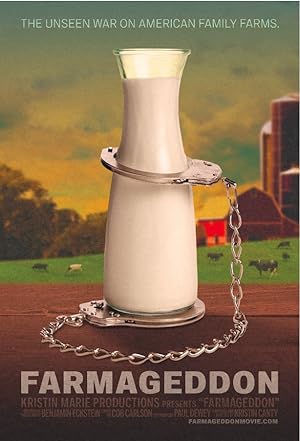Farmageddon is a preach to the choir, but hoping to convert documentary about the tribulations of being a small food distributor in the world of corporate farming and big government. Farmageddon categorizes small food distributors as a private contract between individuals to evade regulations and solely challenge government authority in court. The majority of the stories are told from the side of the aggrieved and sympathetic families affected while the government refuses to comment.
I enjoyed watching Farmageddon, but there are two sides to every story, and the aggrieved party may not concede that the other side has a point or fully understand all the rules involved in his or her situation. Farmageddon has an agenda and owes no fiduciary obligation to do anything but gain support from viewers. Just because I may favor that agenda does not mean that I think that Farmageddon did an objectively good job making its case. I love animals, and the mad sheep (there is no such thing) case in Vermont was heartbreaking. Farmageddon elicits viewers’ sympathies by having viewers related to individuals’ stories against a faceless government. Whom else could we sympathize with? The government does have a face, and Farmageddon gives a brief glimpse of them-soft-spoken middle-aged women casually dressed in slacks standing next to a truck.
I earn my money working for the government, but not the federal government and nothing related to the subject matter addressed in Farmageddon. When I hear people complain about what the government does, it frustrates me that the government officials involved are also hampered by the same laws and cannot present the other side of the story. If the government was more transparent and could rebut claims of bad conduct, many people may agree with the government. Fortunately the government is hampered because of privacy laws to protect the citizens involved. I wonder if the citizens signed a waiver and gave permission in during the making of Farmageddon or if such privacy rules prevented the government from fully responding. I think that the government does not do itself any favors by not engaging in more interviews about the history of food laws and administrative law.
I am about to make myself guilty of the same thing that Farmageddon did and use an anecdotal, amateur explanation for why I believe there is a plausible reason why there were initially laws against the distribution of raw milk products. I took a weekend cheese course at Murray’s Cheese in NYC. You can blame Hitler! I’m not kidding. Because so many farmers had to go away for war, dairy production was not as sanitary as it was before because amateurs were substituting for them, and many Americans died. I was frustrated that Farmageddon only focused on battles in court and did not depict the legislative struggle to reform possibly outdated laws. Instead they just allude to conspiracy theories about lobbyists, big agriculture and the federal government, which may be true, but was unsubstantiated in Farmageddon.
Farmageddon just needs to be honest. The majority of Farmageddon’s interviewees are using the term contract instead of public distribution of food as a way to avoid the consequences of what is outright civil disobedience because they find the idea distasteful. The subjects of this government enforcement are not used to being on the wrong side of the law and understandably expect the government to reflect their values and expertise instead of ignoring them. Not everyone is as privileged as the participants in Farmageddon to expect to be heard by their government without severe sacrifices as unfair as that may be.
Stay In The Know
Join my mailing list to get updates about recent reviews, upcoming speaking engagements, and film news.




